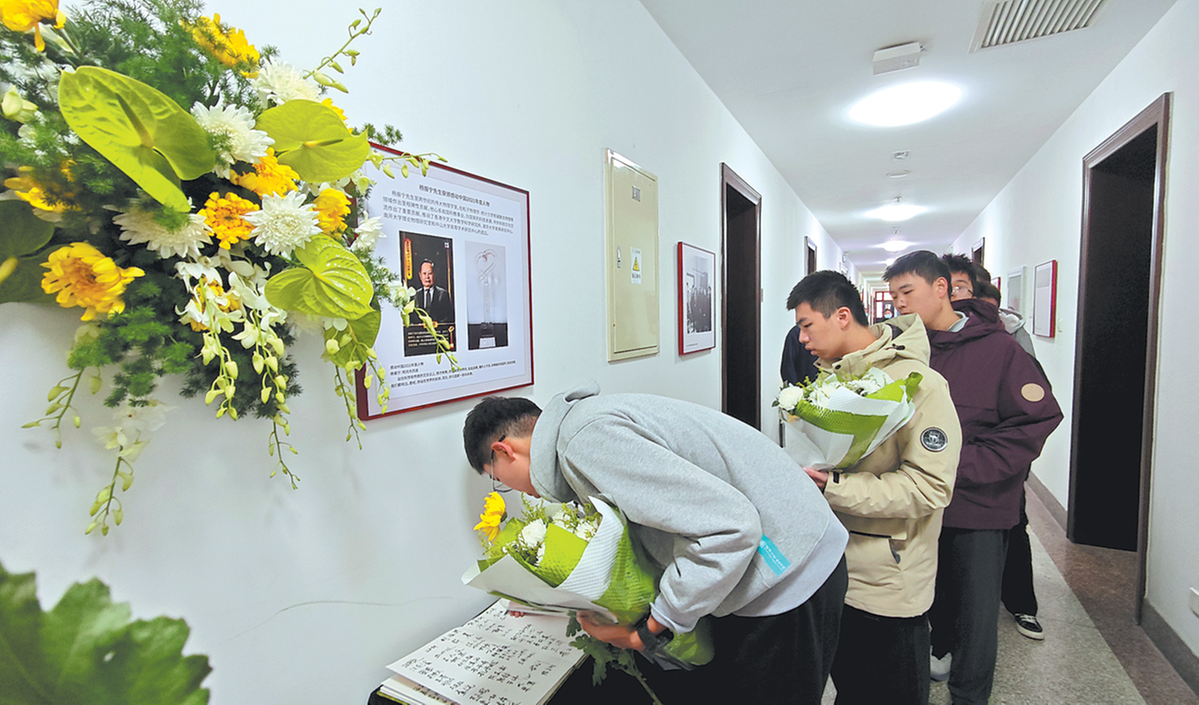Scientific community, netizens pay tribute to late Nobel laureate Yang Chen-Ning


Tributes are pouring in from universities and scientific institutions across China and heartfelt messages are flooding social media following the passing of renowned physicist and China's first Nobel laureate Yang Chen-Ning, who died in Beijing on Saturday at the age of 103.
The nation remembered with pride the profound legacy of Yang, who was celebrated not only for his monumental contributions to physics, but also for his unwavering patriotism.
Yang was born in Hefei, Anhui province, in 1922. His father was a mathematics professor at Tsinghua University. A young Yang grew up on the campus, surrounded by books and ideas that would shape his future.
In the 1940s, he went to the United States to pursue academic studies and subsequently held teaching positions.
Recognized as one of the most eminent scientists of the 20th century, Yang, along with his Chinese-American colleague Tsung-Dao Lee, proposed the "nonconservation of parity in weak interactions", a revolutionary theory that reshaped human understanding of nature's laws and won them the Nobel Prize in Physics in 1957.
Yang's later works continued to influence the very structure of modern physics. The Yang-Mills theory, developed together with American physicist Robert Mills, laid the foundation for the Standard Model in particle physics, comparable in significance to James Clerk Maxwell's equations and Albert Einstein's theory of general relativity.
Following his demise on Saturday, the Institute for Advanced Study at Tsinghua University, where Yang served as honorary director, set up a memorial room. By 8:50 am on Sunday, a line of mourners had formed, waiting to pay their last respects to the brilliant scientist. The memorial room, which will be open until Friday, features a display board honoring Yang and his groundbreaking work in physics.
Speaking to Beijing Daily after bowing and laying flowers in the memorial room, Chen Yuxuan, a third-year PhD scholar at Tsinghua's School of Physics, said: "I am in the field of quantum information research. It's a great regret that I never had the chance to meet Mr Yang on campus, but his name is known to everyone in the physics school. He is a role model for all teachers and students."
Tsinghua University released an obituary on Saturday, calling Yang "an immortal legend in exploring the unknown". His life stands as a timeless chapter in human history — one that shines not only for China, but for the global community of thinkers and innovators, it said.
The China Association for Science and Technology also issued a statement, commemorating Yang's pivotal role in bridging scientific communities. It highlighted his courageous visit to China in 1971, when Sino-US relations were still estranged, calling him an "unrivaled bridge for scientific friendship and exchange".
A wave of remembrance also swept through China's social media platforms.
On Sina Weibo, hashtags about Yang made it to the trending list, garnering millions of views. Countless netizens, including young science enthusiasts, shared his famous quotes and photos.
Many shared the story of his 50-year-late response to a message from his friend, nuclear physicist Deng Jiaxian, who wrote him a letter in 1971. Yang shared the letter at his centennial birthday party in 2021 and said, "I can say to you with confidence that my last 50 years have been in accord with your 'common path' wish."
This narrative of profound friendship and shared commitment to the nation deeply moved social media users.
Dozens of universities released statements recalling Yang's profound influence.
Nankai University honored him as the founder of its theoretical physics laboratory. Xi'an Jiaotong University said his visionary 2000 speech on innovation and education at the university "remain as light, undimmed in the long river of time".
Southeast University, Shanxi University, Anhui University and Guangxi University all detailed his visits, guidance and steadfast support for their development.
Yang's final years were marked by the return to his roots. He became a professor at Tsinghua University in 1999, and worked and lived there since. He once said his life was a journey that had come a full circle — from his childhood on the Tsinghua campus to his final years back in its halls.
Yang's wife, Weng Fan, said she believes that when he left, his heart was at peace.
"His life stands as a profound contribution to the rejuvenation of our nation, the strength of our country and the progress of humanity — a legacy etched in the annals of history," she said in an article published in Guangming Daily on Sunday.
"I trust that whenever we look up at the starry sky at night, we will find Professor Yang smiling down upon us from one of those stars."




































